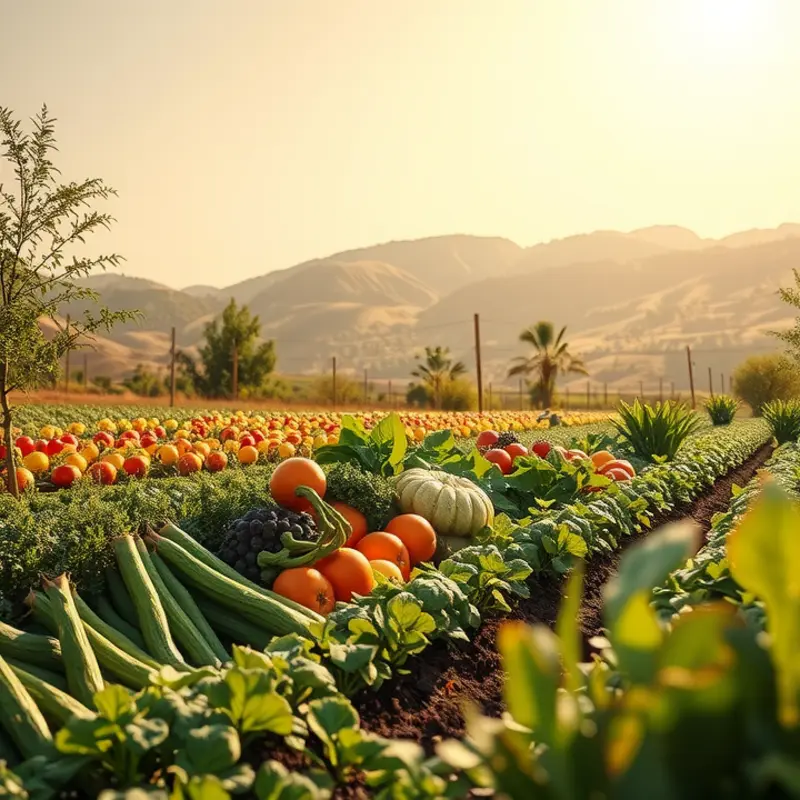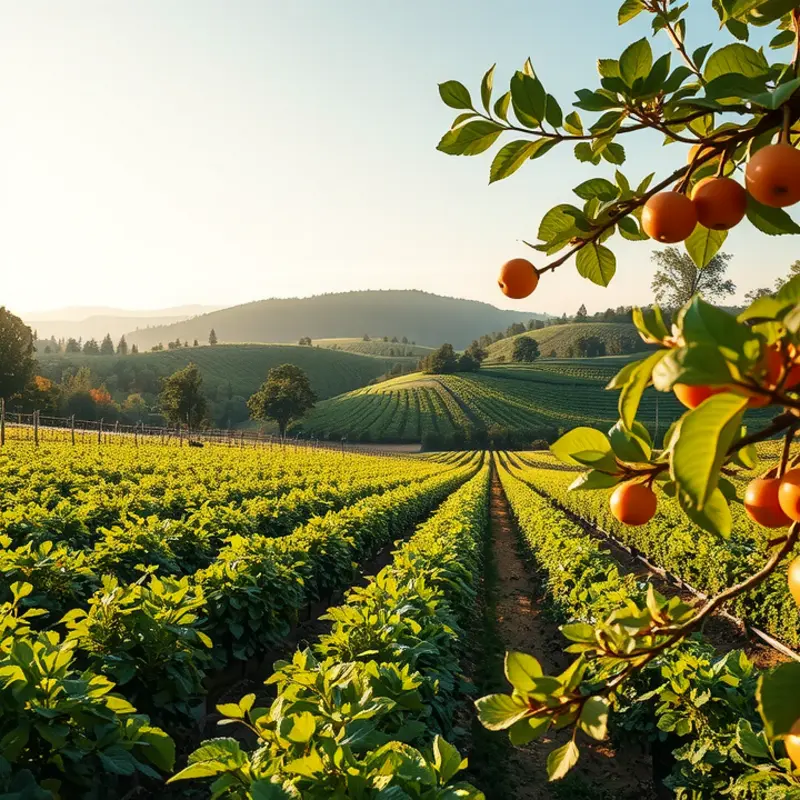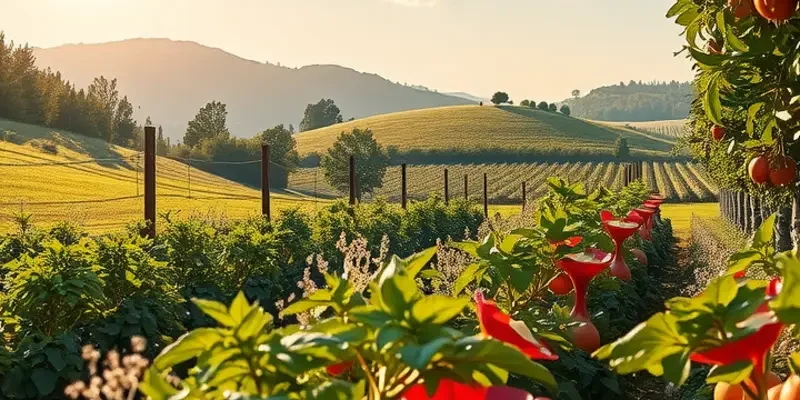Sustainable food choices are essential for a healthier planet. By supporting environmentally-friendly farming methods, we can contribute to a system that respects nature and promotes biodiversity. Sustainable agriculture focuses not on mere yield but on maintaining ecological balance, ensuring that our choices are beneficial not only for ourselves but for generations to come. From organic produce to regenerative farming practices, this guide illuminates the path toward informed, eco-friendly eating habits.
Understanding Sustainable Agriculture

Sustainable agriculture is more than an idea—it’s a multifaceted approach to feeding our planet while safeguarding our natural resources. By adopting practices that focus on environmental health, social equity, and economic viability, sustainable agriculture offers a holistic model. It challenges conventional methods that often deplete resources, harm ecosystems, and prioritize profit over planet.
Central to sustainable agriculture are several principles: maintaining healthy soil, reducing resource input, and enhancing biodiversity. Healthy soil, enriched through natural composting and crop rotation, supports robust plant growth and requires fewer chemical fertilizers. Using compost and cover crops nourishes the soil and reduces erosion. Meaningful reduction in inputs like synthetic fertilizers and water is equally vital. Drip irrigation and rainwater harvesting are examples of water-efficient methods that minimize waste.
Biodiversity plays a crucial role in resilience. Polyculture, the practice of growing multiple crops together, mimics natural ecosystems, reducing pest outbreaks and improving resilience against climate shocks. Diverse plantings also support a broader range of beneficial insects, leading to more stable crop yields without the need for harmful pesticides.
Beyond the farm, sustainable agriculture impacts food systems, promoting local and seasonal eating. The benefits extend beyond reducing carbon footprints associated with long-distance transportation. Seasonal and local produce are typically fresher and more nutritious. Farmers’ markets and community-supported agriculture programs create direct links between consumers and growers, fostering transparency and trust in food sourcing.
Sustainable agriculture also addresses significant health concerns. By eliminating excessive chemical applications, it reduces toxins entering our food chain. Environmental stewardship associated with these practices significantly contributes to a healthier planet. Maintaining clean waterways by reducing runoff from fertilizers and pesticides reverses damage done to aquatic ecosystems and biodiversity.
This conscientious approach to growing food has social implications. Sustainable farming practices often emphasize fair labor practices, ensuring that farmworkers have safe conditions and fair wages. It promotes smaller, family-owned farms, keeping profits within communities and enhancing local economies.
Sustainable agriculture, however, requires our active participation and support as consumers. By choosing foods grown this way, we advocate for systems that respect the earth. Engaging in thoughtful consumption ties into broader food psychology, encouraging mindfulness about food choices (read more about mindful eating).
Recognizing the interconnectedness of environmental health, social equity, and economic strength through our food choices enhances our well-being and continuity on this planet. By prioritizing sustainable agriculture, we pave the way for a future where food production nourishes both people and planet.
Foods That Embrace Sustainability

Choosing foods that embrace sustainability supports both our planet’s health and personal well-being. Sustainable agriculture focuses on practices that conserve resources, maintain soil health, and protect ecosystems. Let’s explore some foods that are leaders in sustainability and discover the benefits they offer to our diet and world.
Ancient Grains
Quinoa, amaranth, and millet have been cultivated for thousands of years. These ancient grains are known for their resilience under adverse growing conditions, requiring less water and fertilizer compared to modern crops like wheat or rice. Including them in your meal planning can enhance nutritional diversity and reduce environmental impact. Ancient grains are rich in fiber, vitamins, and proteins, making them an excellent substitute for processed grains. For ideas on incorporating these grains into your meals, check out practical ingredient batching.
Legumes
Beans, lentils, and peas are champions in sustainable foods. They enrich the soil by fixing nitrogen, reducing the need for synthetic fertilizers. Legumes are also water-efficient crops and are vital sources of plant-based proteins and essential nutrients. When selecting legumes, opt for those grown locally to further minimize the carbon footprint linked to transportation. Incorporating more legumes into your diet can contribute significantly to a balanced and eco-conscious lifestyle.
Perennial Vegetables
Unlike annuals, perennial vegetables like asparagus and artichokes don’t need to be replanted each year. This reduces soil disturbance and minimizes erosion, promoting healthier ecosystems. They thrive with fewer pesticides and fertilizers, which translates into less environmental degradation. Perennial vegetables offer a rich source of vitamins and minerals, enhancing your diet’s nutritional value.
Fruits from Agroforestry
Agroforestry integrates trees with crop and livestock farming, enhancing biodiversity and land productivity. Fruits like apples and nuts grown in such systems support this sustainable practice by maintaining and enhancing ecosystem services. When selecting fruits, prioritize those from agroforestry initiatives, contributing to regenerative agricultural practices that balance human nutrition and environmental stewardship.
Organic Produce
Organic farming avoids synthetic chemicals and genetically modified organisms, focusing on natural processes and cycles. Opting for organically grown produce supports soil health, reduces pollution, and promotes biodiversity. Organic fruits and vegetables can offer higher antioxidant content, providing health benefits alongside their environmental advantages. To ensure authenticity, look for certified organic labels while being aware of local growers who follow organic principles without formal certification.
Choosing such sustainable foods aligns our dietary practices with ecological care, fostering a regenerative food system. By sourcing responsibly, we empower sustainable farmers, enhance our nutritional profiles, and contribute to a resilient planet healthier for future generations.
Final words
Selecting sustainably grown foods is a conscious choice that can yield significant benefits for both personal health and the environment. By understanding sustainable agriculture, you contribute to a movement that prioritizes ecological balance, promotes biodiversity, and respects natural resources. As consumers, we have the power to influence farming practices by supporting local farmers and businesses that uphold sustainability. Every meal is an opportunity to make a positive impact—embrace this responsibility and be part of the solution for a healthier planet. Your choices can lead to a thriving ecosystem where both people and our planet flourish side by side.








